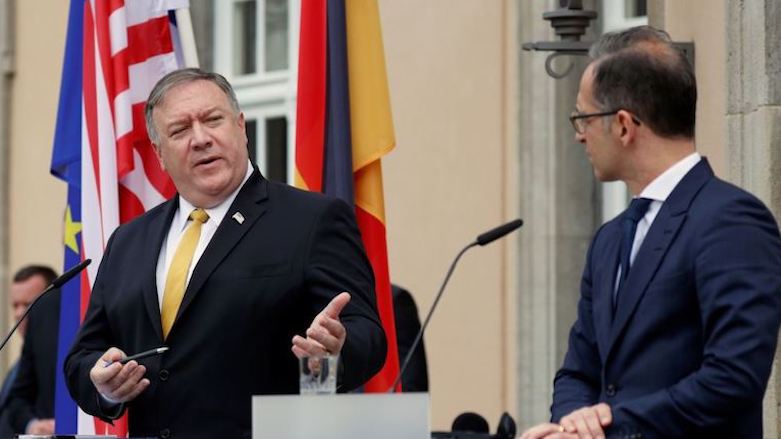Germany backs US plans for safe zone in Syria

WASHINGTON DC (Kurdistan 24) – Germany confirmed on Friday that it supports the US plan to establish a security zone in northeastern Syria along the Turkish border to help maintain stability there, after the drawdown of US forces, which have been working with the Kurdish-led Syrian Democratic Forces (SDF) to defeat the so-called Islamic State.
“We strongly welcome—we very much welcome—the fact that the United States has decided to continue its presence on the ground” in northeast Syria, German Foreign Minister, Heiko Maas, stated in a joint appearance with US Secretary of State Mike Pompeo in Berlin.
The Americans “may have changed the way in which they are present, and the size in which they are present,” but we support them, he said.
Maas confirmed that Germany had been in discussions with the US “in the past weeks and months” about the future of Syria, including the region east of the Euphrates, which has been liberated from the Islamic State.
He also explained that Germany already supports US forces with aerial refueling and reconnaissance aircraft. Although Maas hinted at the likelihood that Germany would provide more support, once the US drawdown takes effect, he provided no details, noting that the mandate for Germany’s efforts must be renewed by the German parliament in October.
Der Spiegel reported on Thursday, in an article entitled, “German ‘Tornados’ are to secure protection zone in northern Syria,”that Berlin had been holding “secret talks” with Washington and had “signaled” to the US “it would be prepared to participate militarily in securing” the protection zone.
The US first asked Germany to contribute to maintaining the zone at the Munich security conference in February, Der Spiegel explained. Subsequently, Berlin responded with an offer to provide air support.
READ MORE: Conflicting US statements, as Europe asked to replace US troops in Syria
Ibrahim Murad, a representative of the Democratic Self-Administration of Rojava and Northern Syria in Germany, welcomed the German decision, calling on “Germany and other countries to take their responsibility in protecting the areas liberated from the Daesh [Islamic State] terrorist group,” as he told Kurdistan 24.
Speaking alongside Maas, Pompeo explained that the US objective in northeastern Syria was to “reduce risk of terrorists attacking from Syria into Turkey and reduce risks that Turkey will come south and disrupt Kurdish activity inside of Syria.”
There is a great deal of concern, including in the US Congress, that after the the bulk of US forces are withdrawn from Syria, Turkey will attack the Kurds and other peoples living along its southern border.
READ MORE: Congressmen affirm support for Kurds against Turkish threats
Pompeo also explained that the US Department of Defense and Germany’s Ministry of Defense “will be engaged to figure out exactly what the right nature of those forces will need to look like.”
Germany, thus, becomes the first European country to publicly express its willingness to participate in maintaining the security zone, even though it will not be with troops on the ground and even though it will require the parliament to approve a new mandate in a few months time.
Whether the parliament will actually do so is not entirely clear. Germany’s left-leaning Social Democratic Party (SDP), which is part of the governing coalition, has already said that it will not renew the current mandate, but, of course, people change their mind, as circumstances change.
European countries, including Germany, have a strong interest in stability in Syria. The civil war there, as well as the depredations of the Islamic State, have created a major problem for parties like the SPD. The influx of refugees generated by those conflicts has contributed to moving European politics to the right, and populist movements have risen on a tide of anti-immigrant sentiment.
(Wladimir van Wilgenburg contributed to this report.)
